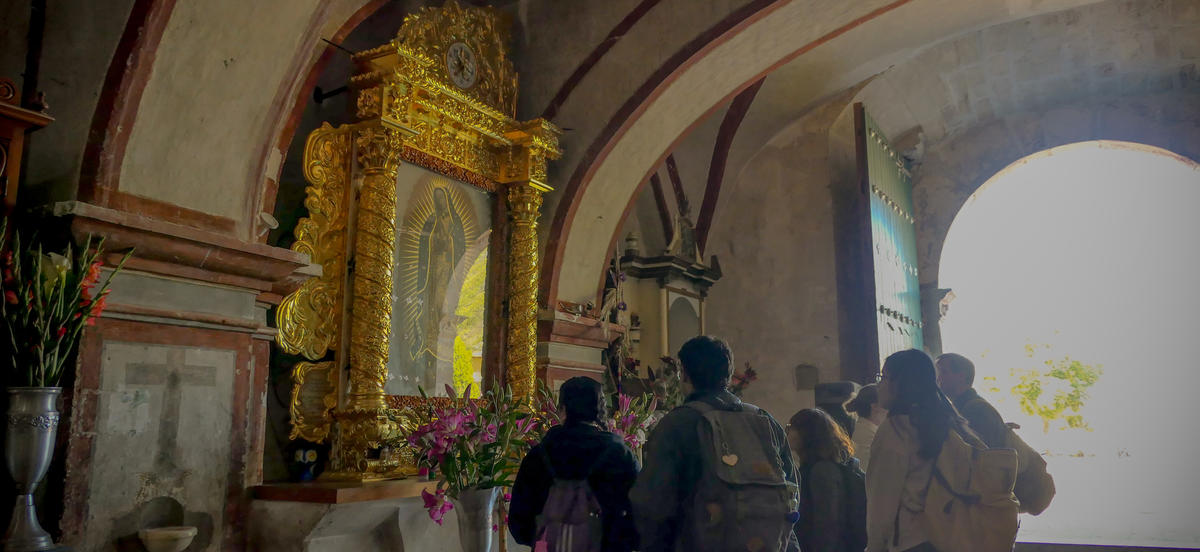CPGC Abroad: The Ticha Project and Ethical Academic Exchange

Details
As the February 11 deadline for CPGC 2024 Summer Fellowship Approaches, learn more about a student-faculty visit to one of the Centers' longest standing partnerships in Oaxaca, Mexico.
Ticha [ˈti. tʃə] — comes from the Colonial Valley Zapotec word for 'word', which can also mean 'language' and 'text'.)
This winter break, six Haverford faculty and students traveled together to the Tlacolula valley in Mexico’s southern Oaxaca region. Their goal was to visit the various sites of one of the college's long term summer-internship partner programs, The Ticha Project. The team sought to better understand how the relationships have evolved over the last ten years, and write a collaborative internal report both outlining Ticha’s central mission, and the ways in which Student interns have made a difference.
After years working on the Zapotec Language, Haverford Professor of Linguistics Brook Lillehaugen began working on the online open-access materials now known as the Ticha Project in 2013.With the exception of COVID’s heaviest pandemic years, student interns have been traveling to Oaxaca every summer since. Students receive cultural sensitivity training prior to their arrival, gaining a deeper understanding of Zapotec cultural practice. Then each student is paired with an Indigenous partner, whom they assist in the audio, audiovisual, and written documentation of Zapotec words in communities around the Valley.
In January, the CPGC cohort traveled from Tlacolula to neighboring Zapotec communities, Teotitlan and Tlacochahuaya to meet with key partners on the Ticha team, Janet Chávez Santiago and Moisés García Guzmán. Participants included students Jorge Paz Reyes, Maria Reyes Pacheco, and Carter Wood, with faculty and staff participation from Lina Martinez Hernandez and Eric Hartman. The group was honored to visit Zapotec educators and community organizers in an experience facilitated by Brook Lillehaugen and Felipe H. Lopez.
Beginning each site visit with a tour of the local church, the days were filled with both meaningful discussion and deep cultural exchange. Zapotec culture exists not only in the language, heard across the busy weekly markets and vibrant town squares, but also in the incredible architecture, music, art, and food central to daily life in the Valley.
These preliminary discussions emphasized the mobilizing force that student intern presence has had in catalyzing Ticha’s expansive mission over the last decade. In those initial days, program leaders repeated that ‘when the students are here, the work gets done’. Not only does the new energy get community members excited to participate, but opens new doors for those like Moisés, who are working to merge visual and linguistic content in new ways.
After a walking tour of his farm, populated entirely by 100% pesticide and chemical fertilizer free crops, the group sat down with Moisés over an incredible meal prepared in house with his own ingredients. For Moises, student support has meant being able to document Indigenous agricultural practices together with the language, enabling him to share his sustainable farming wisdom within his own community. VCAM funded student film project Dizhsa Nabani was a 2018 partnership with Ticha, which documented many facets of Zapotec life, integrating language with culture in a short film format.
Every summer new students arrive, bringing with them unique skills and interests. Some enjoy art or cinematography, while others may work really well with kids. Other Ticha teachers, and partners from neighboring high school, Cetis 124, echoed appreciation for this diversity. While it is no small feat to train an entirely new fleet of student fellows on effective linguistic practice each summer, it was abundantly clear that the partnership has been mutually transformative.
The group ended the trip in Oaxaca city, about forty minutes from Tlacolula, coming together over Mole Rojo, and Tlayudas to synthesize all that they had learned. After nine days spent in conversation and exploration, the key takeaways were clear.
- Staying true to the Zapotec Agenda was key- Above all else, non-extractive academic work must be persistent in turning to community partners to ensure they are equally gaining from the partnership. Student fellows succeed because they enter the program with open minds and a desire to learn and work without their own agendas.
- Galguez - This Zapotec value and practice is one of reciprocity and mutuality. . Emphasis on individual strengths leads to skill sharing in a productive and mutually beneficial environment.
- Organic growth is essential- effective partnership means working at the speed of trust, and that means respecting internal timelines is essential to sustainable partnership. This might mean resisting pressure for externally determined timelines or ideas of growth.
- As Haverford’s CPGC continues to pursue partnerships that reflect ethical resource mobilization, Ticha is an example of how academic work can be transformative for both students and the communities with which they work. Just as students have traveled to Mexico each summer, Ticha partners like Dr. Felipe H. Lopez and Janet Chávez Santiago, have repeatedly been welcomed to campus to discuss their ongoing academic work.
The Ticha Project’s holistic approach to Indigenous language activism is part of a global effort to uplift history and culture which has historically been underrepresented and ignored, particularly in academic settings. Haverford College’s continued partnership with the organization serves to aid in this initiative, giving students the resources they need to learn how to be effective partners in hands-on linguistic field-work.
For students interested in working with The Ticha Project, or one of the CPGCs countless other summer internship experiences, check out the center’s website. All applications for summer 2024 are due February 11.




